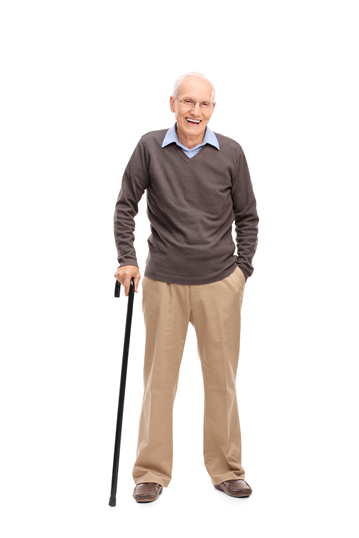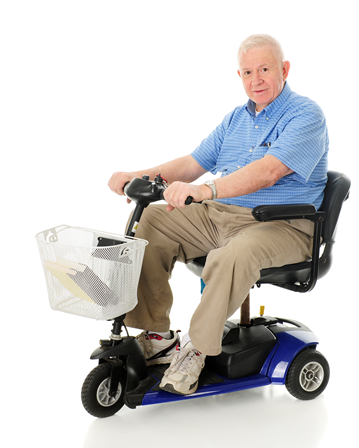Help with mobility at home and outside
Get advice on how to reduce your risk of falling and how to improve your strength and balance.
Falling and worrying you might fall can make you lose confidence. This can have serious consequences for your health and wellbeing.
Top tips to reduce the risk of a fall
- keep active at home, get up more often and move around frequently; join your local Thai Chi, yoga, walking group, or another exercise group
- do strength and balance home exercises that will help you be safe and steady and reduce your risk of falling:
- try them with a friend or family member to gain confidence
- do them at least twice a week for best results
- make your home and garden safer by removing trip hazards, particularly on stairs, in hallways and in the garden
- get good bright lighting
- check the stability and height of your chair, bed and toilet
- minor adaptations could help, for example handrails for stairs or in the bathroom
- make sure your walking stick or frame is in good condition, including the rubber ‘ferrules’ at the end
- regularly check your eyesight and hearing, and wear your glasses and hearing aid
- check your footwear; your shoes and slippers should fit properly, cover the heel and have good grip on the sole
- speak to your GP if you're on four or more types of medication and haven’t had a review recently
- for any dizziness or fainting, organise an urgent review by your GP; in the meantime, get up slowly from the bed or chair and count to 10 before completely standing up
- nutrition and hydration
- drink six to eight cups of water per day, or drink decaffeinated tea and coffee
- avoid alcohol, eat plenty of protein, calcium and vitamin D rich foods to help your muscle and bone strength
- take vitamin D supplements
- think about a pendant or wrist alarm and other telecare equipment such as bed sensors
- keep a mobile phone with you in case you need to contact others
Prevent falls by improving your strength and balance
If you have had a fall, nearly fallen, are worried about falling or if you have had a significant change in your mobility, you may need professional help.
There are exercise classes in local community venues to help you improve your strength and balance. Contact the ‘Strength and Balance Helpline’ on 020 3049 5424, Monday to Friday from 8.30am to 4.30pm. They can arrange any specialist assessment or treatment needed. Family or friends can ring on your behalf. You can leave a message and the team will call you back.
24 hour monitoring equipment (Telecare)
Telecare are devices that are fitted in our home and linked to a 24-hour monitoring centre. Trained operators can contact your family or the emergency services if you fall. Get more information about telecare, equipment and gadgets.
How to get telecare
We may be able to offer you telecare free of charge. We will need to assess your needs to find out if we can provide the telecare free of charge. You may still need to contribute towards the cost of monitored alarms. The maximum weekly charge is £5.75. For further information, see our paying for your care section.
You can also buy telecare from the organisations and shops below:
- Careline 365 has advice on buying telecare equipment
- Age UK has telecare and telehealth advice

Walking equipment
- if your walking stick or frame is broken, call the falls service on 020 3049 5424
- for ferrule replacement (the rubber feet on a walking stick or frame), ask at your local chemist or disability shop
Get an assessment for a wheelchair
If you think you may need a wheelchair, contact your GP who can refer you to the Wheelchair Service for an assessment. The local NHS wheelchair service is based at the Bowley Close Rehabilitation Centre. If you don’t have a GP, call the centre on 020 3049 7760 for advice.
Powered mobility equipment
If you're disabled, The Motability Scheme can help with power mobility equipment such as a new car, powered wheelchair or scooter in exchange for certain income benefits.
The Queen Elizabeth Foundation offers information to disabled people to achieve their potential and live with greater independence. They can assess your needs. You can try scooters and other powered mobility equipment. There is a charge for the assessment.
Living made easy have advice on mobility services, wheelchairs, and scooters.
Storing your scooter safely
Before buying a scooter, think about where you'll store it as we're unable to help with this. Where you store your scooter shouldn't put your or other people’s safety at risk. You'll also need to think about how you'll charge the battery and what the maintenance and service cost will be. We recommend you get insurance.
Getting out in Southwark

You can find information and advice on help with transport in Southwark including how to get a Blue Badge and Freedom passes.
Ageing Well Southwark: help and advice for people in need of support
We commission Ageing Well Southwark to support older people and carers. It offers:
- a shared phone line with our Adult Social Care team for people to find services they need
- opportunities for making friends and building community
- information and advice and practical services to support independence
Visit the Ageing Well Southwark website
Phone Ageing Well Southwark 020 7525 3324 (select option 5)
Further sources of information and support on mobility
- Falls advice from South East London Integrated Care System for people, their family or carers in Southwark who may be worried
- Southwark Disablement Association provides information and advice if you have a physical or sensory disability
- Living made easy provides general advice about what to consider when choosing daily living equipment: contact their helpline on 0300 999 0004
- The NHS has advice on household gadgets and equipment to make life easier
- Research Institute for Disabled Consumers (RiDC) produces research and information to help disabled and older people to live independently
- Turn2us provides information on grants, welfare and other financial help
On this page under ‘documents’ you'll find a leaflet that provides information about care and support for adults with care needs in Southwark. You can download and print this leaflet.
Page last updated: 14 March 2023
